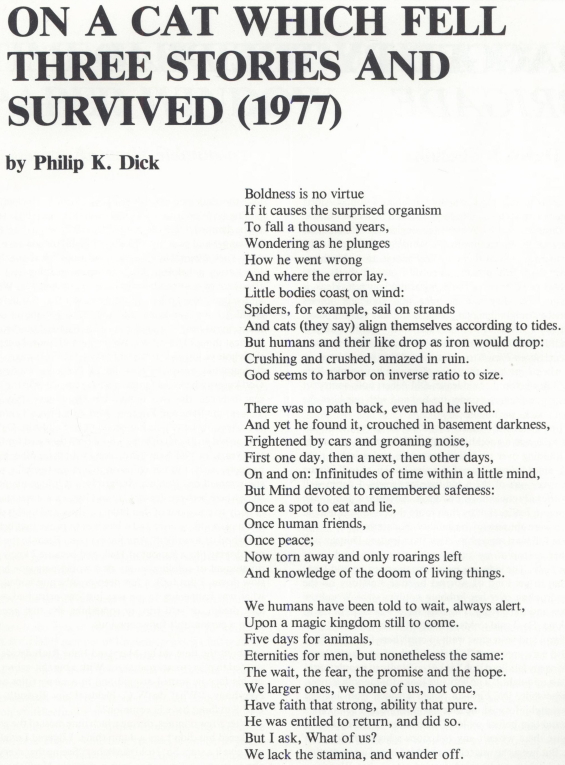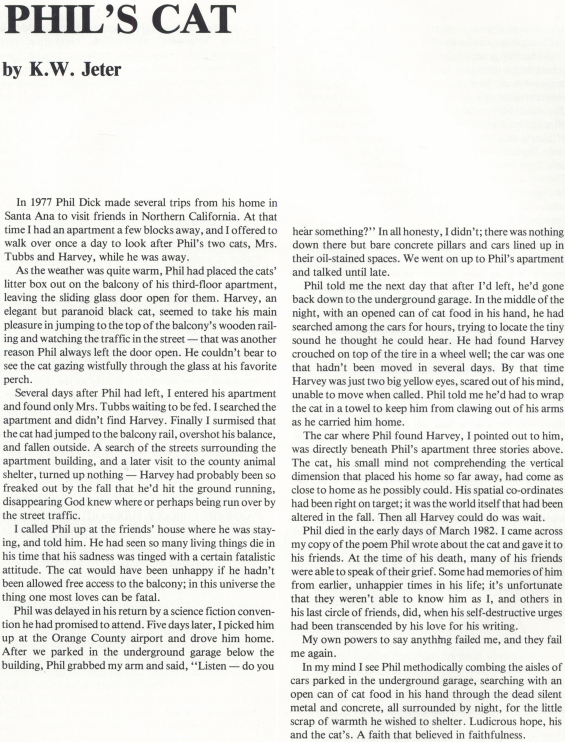
 The SFFaudio Podcast #525 – Jesse, Paul Weimer, Marissa Vu, Evan Lampe and Terence Blake talk about VALIS by Philip K. Dick
The SFFaudio Podcast #525 – Jesse, Paul Weimer, Marissa Vu, Evan Lampe and Terence Blake talk about VALIS by Philip K. Dick
Talked about on today’s show:
1981, science fiction novel?, the long awaited masterwork, you didn’t like it, low expectations, the first half is the best part, it takes place in the head, after the film, the discussion of the film, the Wikipedia, Radio Free Albemuth‘s plot, parallel universe Nixon, state vs. society, Flow My Tears, The Policeman Said, movement cultures, fighting the Black Iron Prison, this is a political dead end novel, is it science fiction?, the opening, SickMyDuck.narod.ru, quasi-consciousness, gobbledygook,
VALIS (acronym of Vast Active Living Intelligence System, from an American film): A perturbation in the reality field in which a spontaneous self-monitoring negentropic vortex is formed, tending progressively to subsume and incorporate its environment into arrangements of information. Characterized by quasiconsciousness, purpose, intelligence, growth and an armillary coherence.
–Great Soviet Dictionary
Sixth Edition, 1992, used in many others, the copyright details about his other books, A Scanner Darkly, the schizophrenic break, good bits, the autobiographical details, fictionalizing his life, not anything like science, most people don’t have a grasp of what science is, a perturbation in the reality field, progressively subsumed?, a collection of words, he’s eating his own prole feed, he takes as fact, a refutation soon accommodated, this skepticism thing, the same plot as 2001: A Space Odyssey, Book Of The New Sun by Wolfe, the hero can reverse time, that’s there, so much better, weird quest, this 2 year old kid who may or may not be Jesus, more like meta-fiction, reintegrate his brain, Psi-Man heal me, he put’s his hand on Fat’s shoulder, self-hugging, he baptized him with chocolate and a hot dog bun, stuff he’s actually done, not fiction, bullshit people all the time, every now and then this should be science fiction, bullshit with his friends, a rough plot, exegesis, we should be upset, puttering about in a small land, so internal, his other half, Small Holywater, Black WanderingEarth, that’s why its a better novel, it has the satellite, in the beginning was the word,
#36. We should be able to hear this information, or rather narrative, as a neutral voice inside us. But something has gone wrong. All creation is a language and nothing but a language, which for some inexplicable reason we can’t read outside and can’t hear inside.
its important to see why people are attracted to this book, words are data as much as visual data, bear scratching against a tree, i present these words to you and they become reality, dope dope dope 500 times, the word loses its sound and its meaning, words on a page are reality, we have to contend with this, how do you know when this is, it’s tremendous, is that true, dreams, your critical faculties are not in full operation, religious people are presented with evidence, adopted accommodated or ignored, causing a crisis, telegraphed far before, we all have this capacity to generate data, distinguishing it from, “Reality is that which, when you stop believing in it, doesn’t go away.”, untethered to critical no no no no, Fat gained strength, self-criticism, Horselover Fat is the early 60s sociological type, Michel Serres, there’s something broken in his head, he’s a car engine and there’s a serious problem with the mechanics, “The Black Iron Prison”, “The Empire Never Ended”, proved, made up in medieval times, the Roman Empire fell in…, time is not what we think it is, K.W. Jeter, Tim Powers,
“You found your way into the upper realm,” Kevin declared. “Isn’t that how you put it in your journal?”
#48. Two realms there are, upper and lower. The upper, derived from hyperuniverse I or Yang, Form I of Parmeni-des, is sentient and volitional. The lower realm, or Yin, Form II of Parmenides, is mechanical, driven by blind, efficient cause, deterministic and without intelligence, since it emanates from a dead source. In ancient times it was termed “astral determinism.” We are trapped, by and large, in the lower realm, but are, through the sacraments, by means of the plasmate, extricated. Until astral determinism is broken, we are not even aware of it, so occluded are we. “The Empire never ended.”
A small, pretty, dark-haired girl walked silently past Fat and the huge old woman, carrying her shoes. At breakfast time she had tried to smash a window using her shoes and then, having failed, knocked down a six-foot-high black technician. Now the girl had about her the presence of absolute calm.
“The Empire never ended,” Fat quoted to himself. That one sentence appeared over and over again in his exegesis; it had become his tag line. Originally the sentence had been revealed to him in a great dream. In the dream he again was a child, searching dusty used-book stores for rare old science fiction magazines, in particular Astoundings. In the dream he had looked through countless tattered issues, stacks upon stacks, for the priceless serial entitled “The Empire Never Ended.” If he could find it and read it he would know everything; that had been the burden of the dream.
so many comic books, he’s obsessed in a way,
Prior to that, during the interval in which he had experienced the two-world superimposition, had seen not only California, U.S.A., of the year 1974 but also ancient Rome, he had discerned within the superimposition a Gestalt shared by both space-time continua, their common element: a Black Iron Prison. This is what the dream referred to as “the Empire.” He knew it because, upon seeing the Black Iron Prison, he had recognized it. Everyone dwelt in it without realizing it. The Black Iron Prison was their world.
Who had built the prison–and why–he could not say. But he could discern one good thing: the prison lay under attack. An organization of Christians, not regular Christians such as those who attended church every Sunday and prayed, but secret early Christians wearing light gray-colored robes, had started an assault on the prison, and with success. The secret, early Christians were filled with joy.
this is ho you make science fiction this is not science fiction, superimposing the present on the past, James Joyce, 1981 or 1982, Paris, one of the greatest philosopher’s of the 20th century Gilles Deleuze, cinema, a vertical time axis, Marie Louise Von Franz, Jungian theory, a second axis of time, Wolfgang Pauli, tied to a particular experience, a working out of it, dipping into it, this is basically what it is, not that revealing, nonsense, the big words that he’s using, essay writing as a game, write them first, the way Star Trek: The Next Generation technobabble, reverse the polarity of the neutron flow, a black iron prison, does the blackness refer to the iron, its just a phrase that popped into his head and he thinks, this is how religions are birthed, coming straight out of it, so sad, hilarious Philip K. Dick bits, a mental breakdown on the page, a slow decline into depression and isolation, A Scanner Darkly except real, new religious movements, subjective experiences, William James, is there anything not referenced in here, a trained philosopher, Dick doesn’t do any of that stuff, multidimensional, masterful from the beginning, the only sad thing Terence can see, male male male all along, one sided, The Exegesis a fake book, this is a novel, a metafiction novel, its not a fantasy, he perceived those perceptions, its most interesting to him, where it intersects with the stuff in his previous writings, from the beginning, The Cosmic Puppets, much more grounded, breaking himself off from himself, he gets stuck in this loop, I have become a mechanical function of my own idea, a rat trying to get on a rat-proof ship, something mechanically wrong in his brain, the rest of the engine was good, a terrible metaphor, he goes to the therapist and the therapist becomes part of the problem, going back to the themes of the institution vs. the individual, the police steal his stuff, this is not a political book, the society against the state, encouraging movements to do little things, the resistance is always there, in Valis we gotta find Jesus, his interpretation, The Divine Invasion, Shadow And Claw by Gene Wolfe, symbols invent us, the symbol took over his mind, The Transmigration Of Timothy Archer, a cathartic effect, juxtaposing is the problem, that’s the science fiction aspect, its a theory, its unfalsifiable,
9
Wordsworth’s “Ode” carries the sub-title: “Intimations of Immortality from Recollections of Early Childhood.” In Fat’s case, the “intimations of immortality” were based on recollections of a future life.
In addition, Fat could not write poetry worth shit, despite his best efforts. He loved Wordsworth’s “Ode,” and wished he could come up with its equal. He never did.
Boldness is not virtue, Spiders sail on strands, there was no path back, crouched in basement darkness, on and on, infinitude of time, Mind, now torn away, We humans have been told, We larger ones, What of us we lack the stamina, a summary of the book, cats, the key to decoding it, Phil’s Cat by K.W. Jeter, two of PKD’s cats: Mrs. Tubbs and Harvey (an “elegant but paranoid” black cat), lots of stuff from book, a fatalistic attitude, the thing one most loves can be fatal, “Listen, do you hear something.”, with an open can of catfood, two big yellow eyes, his small mind not comprehending the vertical dimension, his spatial coordinates had been right on target, March 1982, his self destructive urges had been transcended, methodically combing the isles, a little scrap of warmth, ludicrous hope, a faith that believed in faithlessness, in the light of the story, this is what the empathy thing he’s so known for is all about, very beautiful, a lot of empathy for cats, his weird relationship with women, weird resentments, retroactive blaming the women, his empathy for women is his bad side, Sherry with cancer, suffering something so horrible, is that his perception or is that the reality, did she know that she was doing that, how do you know that?, citing citations, does she know she’s doing that, that’s the main problem, confronted with both sense data and actual sentences and both are not subject to critical questioning, Jesse saw a ghost once, Jesse loves the idea of ghosts, part of a letter, Last Wave, Summer 1984, The Shadow Out Of Time, hypnagogic images, conversations with, John W. Campbell, ultimately always better, Gene Wolfe’s similar cosmogony, between Dick and Wolfe, a better thinker, he saw Dianetics was bullshit, it seized on him, religion as a kind of a mania, latching on to their stories, Bishop Pike, if Philip K. Dick had access to the internet, anamnesis, three meanings, obsessing over etymology, etymology is everything, he’s in improv, I’m a toaster, have you eaten your toast?, you always go with it, your sense data or your sentence in front of you Jabberwocky, brillig, his vorpal sword, runcible spoon (a grapefruit spoon), runcible to runciter, something animals don’t really do, its almost like we can fall down a well of only believing this one book from 4000 years ago, writing down experiences they never had with a guy they never met, and he’s wrong, a druid ceremony, not the only story even he’s caught up in it, a half hour of notes, Tractates Cryptica Scriptura, usually it takes whole cultures to make a cosmogony, the appendix is kind of useful, in Evan’s podcast episode on Valis, The Gospel According To Philip K. Dick,
50. The primordial source of all our religions lies with the ancestors of the Dogon tribe, who got their cosmogony and cosmology directly from the three-eyed invaders who visited long ago. The three-eyed invaders are mute and deaf and telepathic, could not breathe our atmosphere, had the elongated misshapen skull of Ikhnaton, and emanated from a planet in the star-system Sirius. Although they had no hands, but had, instead, pincer claws such as a crab has, they were great builders. They covertly influence our history toward a fruitful end.
Kilgore Trout, Cosmos: A Personal Voyage, an endless hole, the discovery of planets doesn’t occur for quite a long time, an external place vs. another realm, his citation is it seems to me it must be true, horoscopes, there are no dis-confirming facts (until their is), a giant radical shift, its in the paper, if its published its true, the New York Times and The Washington Post, how we get offended by people’s words, you know I don’t REALLY believe this right, I know I’m nutty, the amount of time you spend on it, something is pulling their brain, a cool fact, bloodtype tells about your personality, you don’t know your blood type?, that’s very o positive, imagine saying that about someone’s race, we can’t conceive of that being a thing, this is destiny, this is how all the religious functions work, auspicious, looking good, Roman birds, suspicious, I don’t think we can trust this, trapped in a world of etymology, etymology as destiny, the fake etymology of embarrassed, Jesse doesn’t want to give it up, magic words, pickaninny, niggardly, the airplane was retarded by the braking process, the sound of it is not offensive, words are presentations of reality, the whole whale language thing, cobol, c++, I saw a ghost, I saw a red hat, red hats are not nice hats, words on a page, in your ear, on a sign, causing a dysfunction within us, that’s this book, that’s why this book has power, the revelation is surprising because almost nobody else ever talks about it, not a universal truth, how he described it to Anne, I’m writing an autobiography about BOTH of my personalities and I’m calling it VALIS, structure it as a self-conscious whatever, so much based on actual events, there is no VALIS film, he did call up somebody in Hollywood, he barely knew Gloria, a friend of his, Sic transit gloria mundi, pathology, sending up, funny bits pointing, making fun, he’s deflating the thing in real time, if he lived in our age, the pot showing up in the film, a fish symbol, the DNA molecule, how it connects to Galactic Pot-Healer, this pot did exist, oh yeah, of course, the jewelry in The Man In The High Castle, a photograph of him leaving the funeral early climbing into a Volkswagen, whose reaction is more authentic, if he were a girl, subject to criticism, ditzy, quite pathetic, pathos, Greek for feeling, how great he is at saying that experience of watching a film, applying the rules of filmwatching, Blade Runner, did they intend this to be the meaning, what about the eyes being lit up, different actors disagreeing, as a piece of fiction I’m allowed to spin up as many theories as I want, things outside of the film, where is the meaning?, the meaning goes out the window, macro-focused in the wrong direction, I didn’t see this the first time, adding Phil to the Skype call right now, at the time vs. now, almost guaranteed, everything in there is searchable, Reading, Short And Deep, looking at the text, breaking past the fourth wall into two different axis, no time is god, the boy can replace his wife who has died, its amazing, how seriously should we take this?, Parsifal,
Parsifal is one of those corkscrew artifacts of culture in which you get the subjective sense that you’ve learned something from it, something valuable or even priceless; but on closer inspection you suddenly begin to scratch your head and say, “Wait a minute. This makes no sense.” I can see Richard Wagner standing at the gates of heaven. “You have to let me in,” he says. “I wrote Parsifal. It has to do with the Grail, Christ, suffering, pity and healing. Right?” And they answered, “Well, we read it and it makes no sense.” SLAM.
which heaven do you go to?, the savior saved?, you’re the gods, the typical Nietzsche thing, glorified stupidity, a similar joke in episode 3 of Watchmen, the world being enduring suffering, Amfortas, three superheroes go to heaven, Nite Owl, did the comedian go to heaven?, how many people did you kill?, super moral, Ozymandias, Dr Manhattan, I’m already there, these things that seem to have great meaning, action set pieces, Harry Potter, ultimately its empty, Lord Of The Rings, the experience is not just a walk with Gandalf, finding meaning in existence, hiding in a secondary world, something deep there, its about the setups, kids go up and stuff happens, Tolkien would go to heaven, Wagner would go to hell, Rowling would go to hell, go to Valhalla for the Ring, you’re in the wrong heaven, sir, Valhalla ends at Ragnarok, a temporary heaven, done with VALIS, I wash my hands of it, where does it get us?, political or psychological, such an honest portrayal of having a psychosis and also be very aware of what’s happening, whatever philosophy he’s trying to get at, this is not a philosophy, pre-philosophy, gnostic beliefs, the Kult RPG, in the center of the city, a role playing game about trying to find reality, this module, the keeper or the dungeon master, exploring the reality, the players are in a Black Iron Prison.


Posted by Jesse WillisBecome a Patron!





